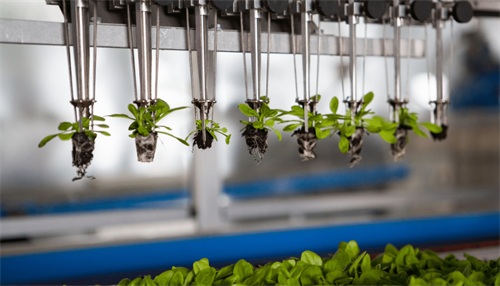How 'Wild Veggie' Farming Is Fueling a $50M Craze?

The convergence of artificial intelligence (AI) and agriculture is ushering in a new era of farming, where technology enhances productivity and sustainability. A notable example is the emergence of 'Wild Veggie' farming, which has captivated investors, amassing $50 million in funding. This innovative approach leverages AI to revolutionize crop cultivation and resource management.
'Wild Veggie' farming refers to the cultivation of crops using advanced AI-driven techniques that mimic natural ecosystems. By integrating AI with traditional farming practices, this method aims to optimize yields while minimizing environmental impact. The substantial investment in this sector underscores the growing confidence in AI's potential to transform agriculture.
Central to 'Wild Veggie' farming is the use of AI for crop management. AI systems analyze data from various sources, including soil sensors and satellite imagery, to monitor crop health and growth conditions. This real-time analysis enables farmers to make informed decisions regarding irrigation, fertilization, and pest control, leading to increased efficiency and reduced resource usage.
Resource Optimization and Sustainability
AI plays a crucial role in resource optimization, ensuring that inputs like water and fertilizers are used efficiently. Intelligent irrigation systems adjust watering schedules based on real-time soil moisture data, conserving water and promoting healthy crop development. Similarly, AI algorithms determine the precise amount of fertilizer needed, minimizing waste and mitigating environmental impact.
Pest and Disease Detection
Early detection of pests and diseases is vital for maintaining crop health. AI-powered image recognition and machine learning models analyze images captured by drones and sensors to identify signs of infestations or infections. This early-warning system allows for prompt intervention, reducing the reliance on chemical treatments and supporting sustainable farming practices.
Economic and Environmental Impact
The integration of AI in agriculture not only boosts productivity but also offers significant economic benefits. Farmers adopting AI technologies have reported increased yields and cost savings, contributing to the sector's growth. Environmentally, AI-driven practices promote sustainable farming by optimizing resource use and reducing chemical inputs, aligning with global efforts to address climate change.
Despite its advantages, the adoption of AI in agriculture faces challenges. Data privacy and security are concerns, as AI systems rely on extensive data collection. Ensuring that farmers' data is protected and used ethically is paramount. Additionally, the initial investment in AI technologies can be substantial, potentially limiting access for small-scale farmers. Addressing these issues requires collaborative efforts from governments, industry stakeholders, and the farming community.
The fusion of AI and agriculture represents a transformative shift toward more efficient and sustainable farming practices. 'Wild Veggie' farming exemplifies the potential of this integration, attracting significant investment and interest. As technology continues to evolve, embracing AI offers promising solutions to the challenges of modern agriculture, ensuring food security and environmental stewardship for future generations.
Recommend for you:

Meta’s Hypernova Glasses: A Glimpse into the Future of Wearable Technology
These advanced spectacles aim to seamlessly integrate digital experiences into our daily lives, but do they truly signal the end of smartphones or are they merely another tech novelty?
JokerSpy Malware: A Wake-Up Call for macOS Security
MacOS has long been celebrated for its robust security features, fostering a reputation as a safe haven for users.
How 'Wild Veggie' Farming Is Fueling a $50M Craze?
A notable example is the emergence of 'Wild Veggie' farming, which has captivated investors, amassing $50 million in funding.
How Biodegradable Robots Are Transforming Agriculture with Eco-Friendly Innovation?
As the demand for sustainable farming and eco-conscious solutions grows, degradable robots are emerging as game-changers that blend advanced robotics with environmental stewardship.
